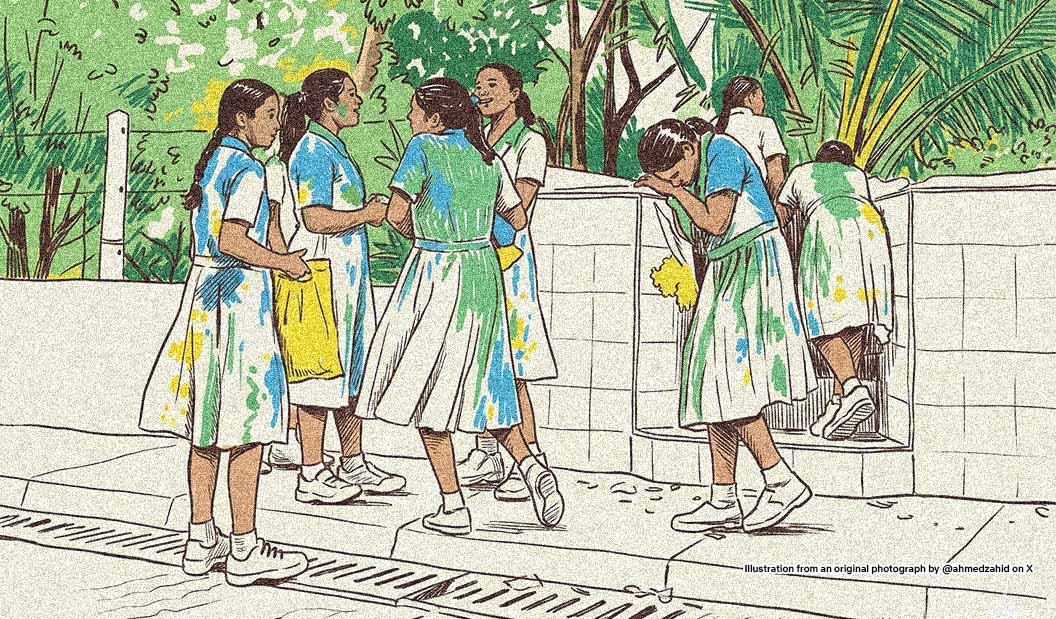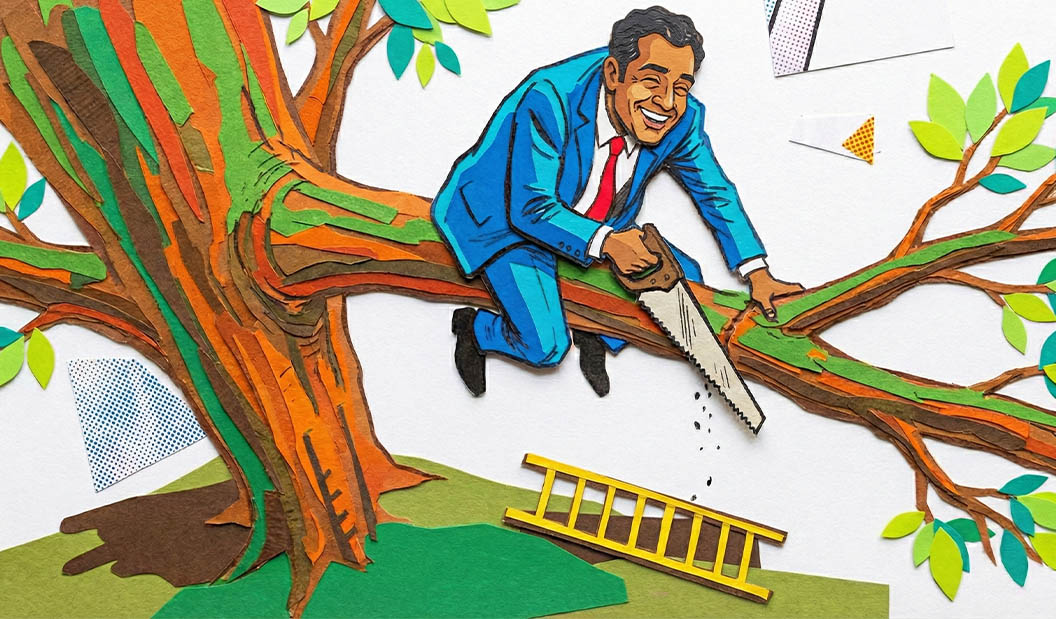August 2024, Male’: We are here. In the 21st Century. The first Century of the third Millenium. And yet, the world of work is starkly different for the woman as opposed to the man.
It is, of course, frightfully alarming that the Sustainable Development Report 2024 tells us that we have regressed as a country in making sure our women have equal representation and participation in the labour force. That dismay is amplified multifold when we rush ourselves back to Census 2022, which unveils a harrowing gender gap in employment where it is 30.5% more likely for a Maldivian to be employed if you are a man!
The world has been apprehensive about the predicted disproportionate impact the Covid-19 pandemic was to have on already existing inequalities between men and women. It is to be ascertained whether the 2020 pandemic has had any further influence on the concerning discrepancy in the labour force participation of the two genders in Maldives. According to Census 2022 while the labour force participation rate of men increased by 3.3%, for women it slumped around at a measly 0.3% between 2014 and 2022. It is also worthwhile to note that the 2014 Census showed an increase of 7.2% in female labour force participation rate from 2006 to 2014, making this trend even more significant.
Embracing or Tolerating Equality?
It is not only the almost stagnant rate of participation of our women in our labour force over the past eight years that is worrisome. It is the magnitude of the gender disparity that evokes serious concerns. The Census indicates that men constitute the larger portion (63%) compared to women (37%) of our working population.
Employment-To-Population Ratio by Age Group & Sex
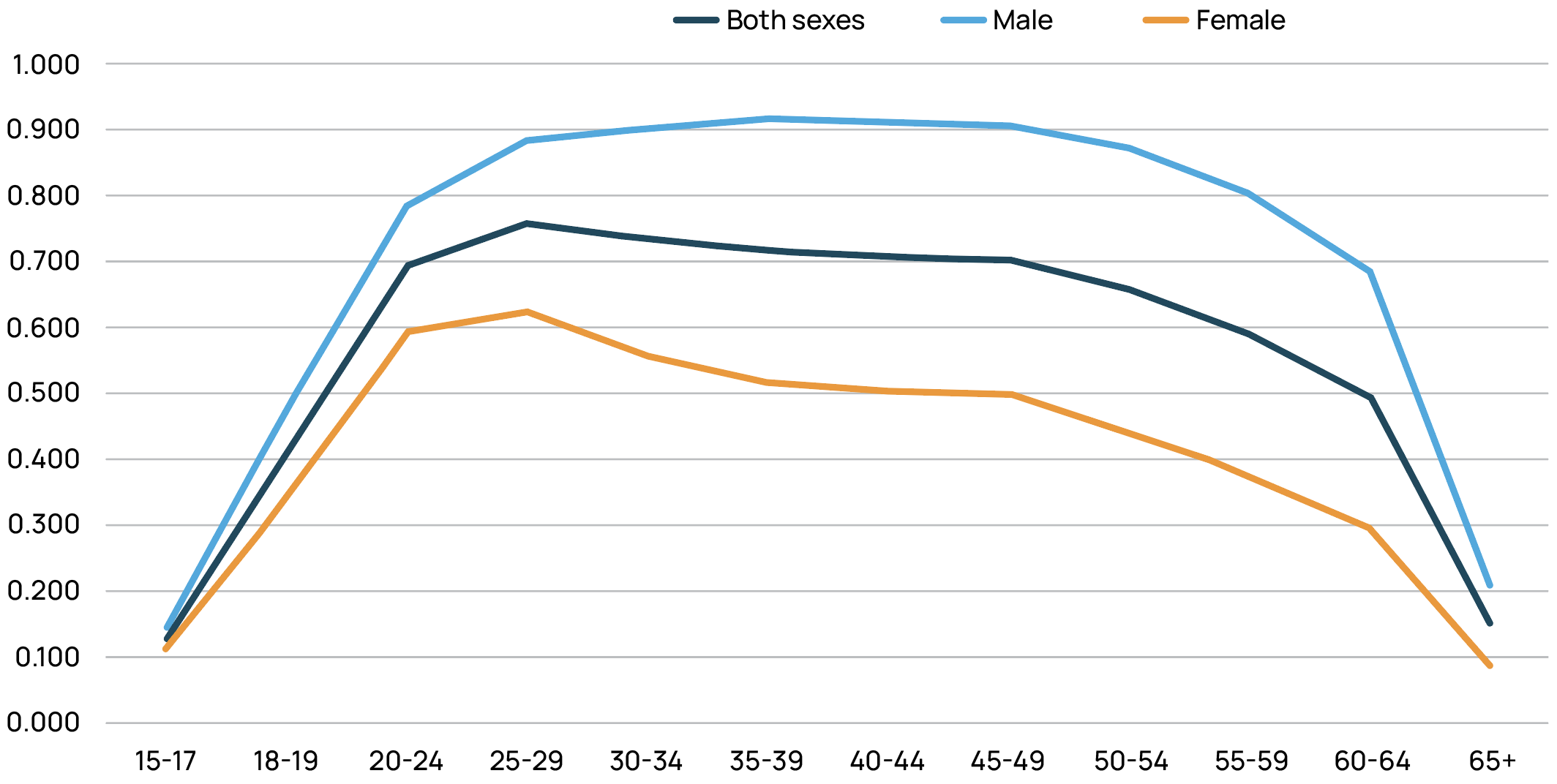
This disparity will significantly impact workforce participation rates, gender roles in society, economic contributions and inevitably social justice. For women this reinforces traditional gender roles, where men are seen as primary earners and women as secondary earners or homemakers. It also perpetuates stereotypes and limit opportunities for women to engage in various economic activities.
With fewer women in the workforce, the economic contributions of half the population are underutilized. This impacts not only individual families but also national economic performance.
“Work and care should not sit at opposite ends of one hard choice”
Around the world, what prevents women from participating and having equal representation in the economy is the significant disproportionate burden of unpaid care and domestic work owing to social cultural and religious norms1. In 2023, Maldivian women on an average spent 19 hours of a 24-hour day on unpaid care and domestic work2. Which is double the number of hours men (8.1 hours) spend doing the same in a day.
The 2018 UN Women/UNFPA study, The Situation of Women in Maldives, conducted four years before Census 2022, highlights several root causes contributing to gender disparity in the Maldivian workforce. Despite educational attainment, many women do not participate in the economy due to domestic responsibilities that hinder their access to higher education and skill upgrades, leading to a deterioration of existing qualifications and work experience. Societal perceptions reinforce women’s domestic roles and unpaid work, expecting them to prioritize family over careers. Cultural norms influence women’s educational and career paths, notably limiting female representation in sectors like tourism. Furthermore, reproductive and domestic roles, regardless of education and employment status, restrict women’s time and capacity to engage in economic work. Especially in the formal sector. The absence of childcare and elderly care facilities exacerbates this issue, reinforcing traditional roles. Additionally, geographical location and mobility constraints significantly affect women’s access to employment opportunities, prompting many to undertake home-based work due to time limitations.
The study also found that women do not enjoy an enabling environment that allows them to seek or sustain employment. Despite legislative guarantees, societal roles and perceptions hinder women from economic participation. Additionally, the structural barriers persist unfavourably for women despite legislative guarantees.
Fast Forward to Today
According to Census 2022 women of working age group continue to live mostly in the administrative isands, away from capital city Male’ where most of the employment opportunities are available. There is widespread internal migration taking place in Maldives where the capital is projected to expect close to 6500 migrants annually where the most common reasons for migration were education and employment. It is imperative to note the emerging trend in gender dynamics of our internal migration where over 50% men migrated for employment and 1 in every 5 women migrated because of or with family.
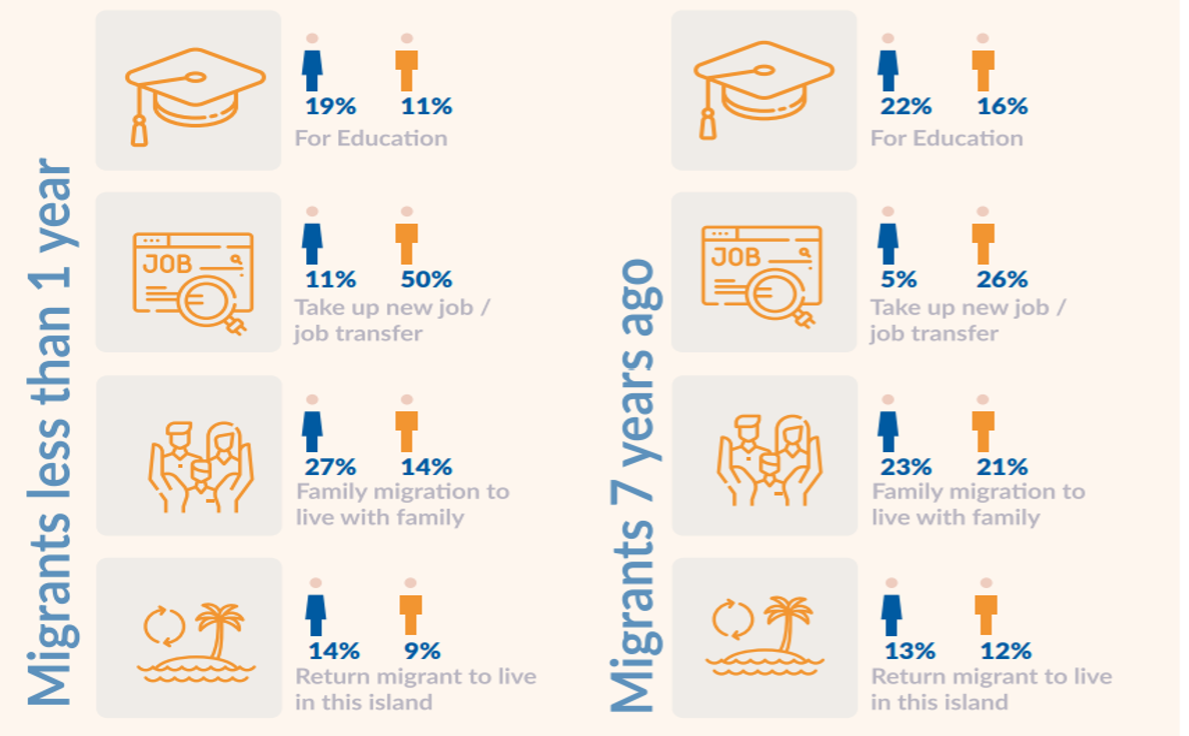
This cements the reality that women face social and structural barriers to accessing employment in Maldives and their movement is often bound to family and subsequent care responsibilities.
We still do not have affordable childcare services. The MDP government’s plans to establish a daycare center under the Asian Development Bank (ADB)-funded Strengthening Gender Inclusive Initiatives (SGII) project was cancelled due to lack of space in the densely congested Male’ city which then was replaced with an initiative to establish workplace childcare facilities such as in the Ministry of Foreign Affairs and some State Owned Enterprises like the Housing Development Corporation Maldives, Ports Limited and State Electric Company3. The People’s Majlis also established a childcare/mother’s chamber in the premises for staff and parliamentarians in 20204 5. Although continuity of these initiatives is to be seen under the current administration, we are still in need of affordable child support/care services for women seeking jobs or aspiring to return to work after childbirth.
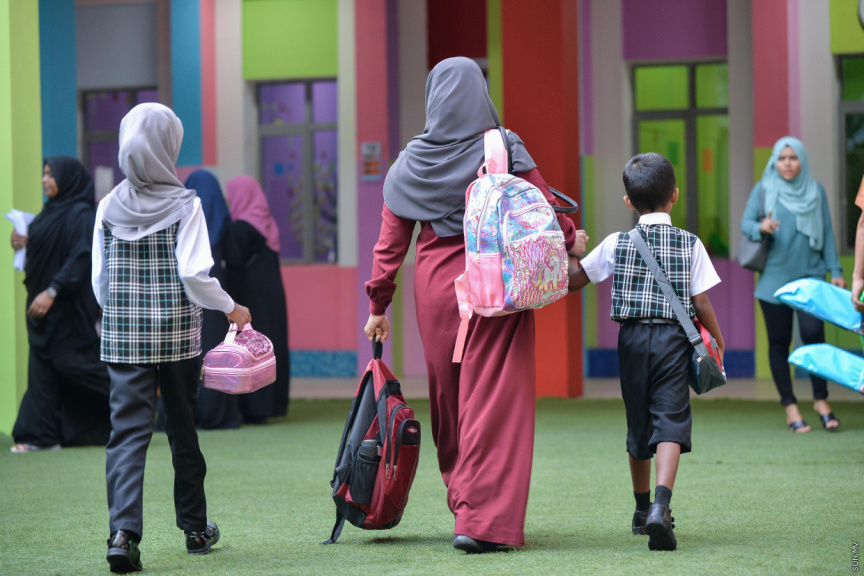
While we wait to see what the current government’s Strategic Action Plan will propose to support women’s increased participation in the economic sector this year, it is to be noted that PNC manifesto does not have any pledges on the provision of affordable childcare support to help eliminate some of the most pertinent structural barriers debilitating economic empowerment of women. It is therefore essential that the current government adopt urgent policy measures to address this structural barrier to alleviate women’s economic participation and give the attainment of Sustainable Developmental Goal (SDG) 5 the push it needs.Through the years of 2014-2022, the highest level of educational attainment of the working population remained as Secondary level. Boys seem to have graduated more at the Secondary and Higher Secondary levels with girls falling short slightly. Interestingly and consistent with the 2018 UN Women/UNFPA Study on the Situation of Women in the Maldives, more women continue to enroll in and attain degrees above undergraduate level in comparison to men in the Maldives.
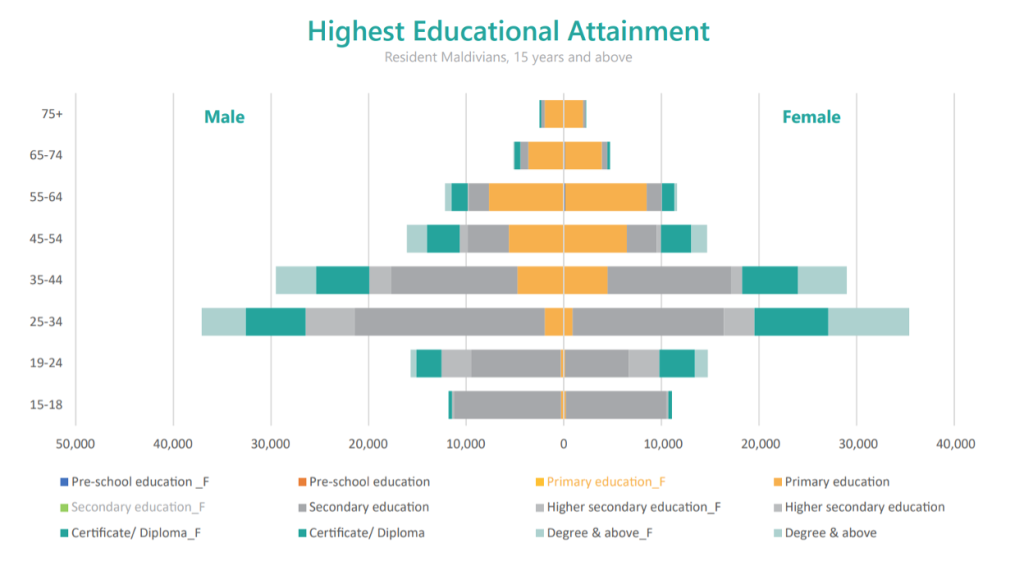
Irrespective of level of education, the Census 2022 clearly highlights that one of the top five reasons people cited for not seeking employment is family and household responsibilities, with a significant gender disparity evident as 92% of those stating this reason were women. Addressing this issue requires challenging and reshaping traditional gender norms to promote equitable opportunities for everyone, regardless of gender.
Glorification of the Double Burden
Social media plays a significant role in the glorification of the double burden placed on working women by perpetuating and idealizing the notion that women can and should excel both professionally and domestically. This double burden, often referred to as the “second shift,” involves women managing both their career responsibilities and a disproportionate share of household and caregiving duties.
Social media platforms like Instagram, Facebook, and Pinterest are rife with images and narratives that present women as flawlessly managing their careers, homes, and families. These portrayals often highlight women who can “do it all,” reinforcing the expectation that women should be able to balance multiple roles without any apparent struggle.
Influencers often showcase their lives as seamless blends of professional success and domestic perfection. They create content that emphasizes productivity, organization, and self-care while managing family responsibilities, which can create unrealistic standards for their followers and further dehumanizing the woman.
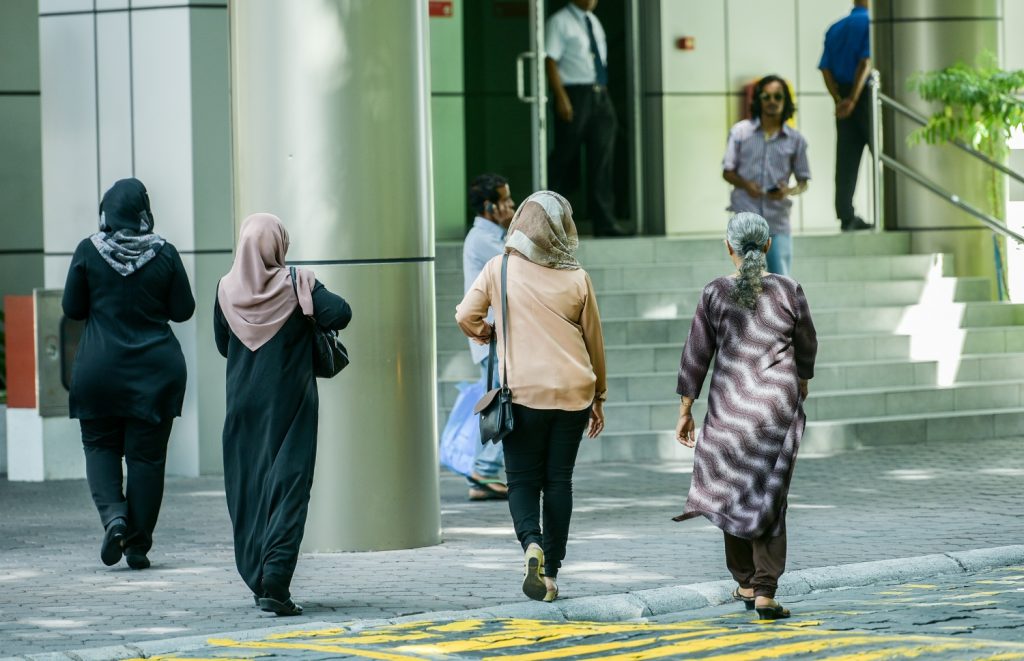
The constant stream of content showcasing idealized versions of working mothers can lead to social comparison, where women feel pressured to measure up to these standards. This can contribute to stress, anxiety, and a sense of inadequacy when they fail to meet these unattainable ideals.
Brands and advertisers often target working women with products that promise to help them manage their double burden more effectively. This commercial narrative further reinforces the idea that women are expected to juggle multiple roles seamlessly and negatively affect the efforts of breaking gender stereotyping in addition to slowing down the transformational change in the deep rooted social norms, traditions and perceptions that is required to alleviate the disproportionate unpaid care and domestic work burden on women.
Hochschild and Machung (2012) in “The Second Shift” talk extensively about how social media often glosses over these additional burdens, presenting a skewed version of reality where the second shift is either minimized or romanticized.
By the beginning of this year., Maldives has become home to 363.3 thousand social media users6. This is 70% of our population and women made 36% of social media users in Maldives. The fact that majority of social media users in Maldives are men, would in turn make it even more challenging to change behaviours and perceptions on persisting traditional gender stereotypes with social media reinforcing and romanticizing the double burden of women. The effort required to challenge and reshape traditional gender norms to promote equitable opportunities for everyone is going to be greater and will need a concerted, programmatic interventions from all stakeholders to address it.
To Move Towards Greater Equality
We have known the barriers affecting women’s economic empowerment in Maldives from evidenced based realities for close to two decades now. The trajectory towards attaining the SDG goal 5 for Maldives, much like the rest of the world, is trailing and vacillating dismayingly7. To expedite progressive realization of the equality and right to work for women urgent policy actions including the proposals herewith are needed;
- Conduct a rapid on the assessment specifically on the lived realities of the women of working age group disengaged with the workforce.
- Ensure increased budget allocation to ensure economic empowerment of women including business and entrepreneurial support for women
- Conduct a state budget analysis to assess expenditure on women empowerment and economic empowerment of women
- Conduct a rapid assessment to study public procurement from a gender equity lens
- Set a political strategy to accelerate gender-equity goals through public procurement
- Introduce policies that encourage flexible work hours, remote working options, and job-sharing arrangements. These measures can help women balance their professional and domestic responsibilities more effectively.
- Increase investment in affordable, high-quality child care and elder care services. Government needs to subsidize these services to reduce the financial burden on families and ensure that women are not disproportionately affected by caregiving responsibilities.
- Encourage employers to provide on-site child care facilities and elder care support programs.
- Launch public awareness campaigns aimed at challenging traditional gender roles and promoting shared domestic responsibilities. These campaigns can use social media to reach a wide audience and create a cultural shift towards more equitable gender norms.
- Integrate gender equality education into school curricula to promote early awareness and acceptance of gender diversity and equality.
- Strengthen and enforce anti-discrimination laws to ensure equal opportunities for women in the workplace. This includes addressing pay disparities, ensuring fair hiring practices, and providing protections against workplace harassment.
- Implement gender quotas in leadership positions within both public and private sectors to promote female representation and decision-making power.
- Provide access to mental health resources and support services for working women. Employers and governments can offer counseling, stress management programs, and support groups specifically tailored to address the unique challenges faced by women balancing multiple roles.
- Introduce policies that encourage both parents to take parental leave. Shared parental leave can help distribute caregiving responsibilities more equally and reduce the expectation that women should shoulder the majority of domestic duties.
- Introduce social media campaigns to negate the negative influence of social media glorification of the double burden of women.
Reference:
- Maldives National Bureau of Statistics. (2023). Provisional result publication [PDF]. Retrieved from https://census.gov.mv/2022/wp-content/uploads/2023/03/Provisional-Result-Publication.pdf
- United Nations Population Fund. (n.d.). Situation of Women in the Maldives [PDF]. Retrieved from https://maldives.unfpa.org/sites/default/files/pub-pdf/situationofwomenrp_webversion.pdf
- UN Women. (2023). Forecasting Time Spent in Unpaid Care and Domestic Work: A Technical Brief. UN Women. Retrieved from https://www.unwomen.org/sites/default/files/2023-10/technical-brief-forecasting-time-spent-in-unpaid-care-and-domestic-work-en.pdf
- Maldives National Bureau of Statistics. (2024). Employment summary [PDF]. Retrieved from https://census.gov.mv/2022/wp-content/uploads/2024/04/Emp_Summary.pdf
- Maldives National Bureau of Statistics. (2024). Education Census 2022 summary [PDF]. Retrieved from https://census.gov.mv/2022/wp-content/uploads/2024/03/Edu-Census-2022_Summary.pdf
- Hochschild, A. R., & Machung, A. (2012). The Second Shift: Working Families and the Revolution at Home. Penguin Books.
- Sustainable Development Report. (n.d.). Maldives. Retrieved from https://dashboards.sdgindex.org/profiles/maldives/indicators
- PSM News. (2023, August 6). Ministry of Gender, Family and Social Services initiates child care service program.Retrieved from https://psmnews.mv/en/111108
- Times of Addu. (2020, October 12). Mother’s room established in parliament. Retrieved from https://timesofaddu.com/2020/10/12/mothers-room-established-in-parliament/
- Human Development Center. (n.d.). Opening child care space [Photograph]. Retrieved from https://www.hdc.mv/photo-gallery/opening-child-care-space-urbanco/
- https://www.unwomen.org/sites/default/files/2023-10/technical-brief-forecasting-time-spent-in-unpaid-care-and-domestic-work-en.pdf ↩︎
- https://www.unwomen.org/sites/default/files/2023-10/technical-brief-forecasting-time-spent-in-unpaid-care-and-domestic-work-en.pdf ↩︎
- https://psmnews.mv/en/111108 ↩︎
- https://timesofaddu.com/2020/10/12/mothers-room-established-in-parliament/ ↩︎
- https://www.hdc.mv/photo-gallery/opening-child-care-space-urbanco/ ↩︎
- https://datareportal.com/reports/digital-2024-maldives ↩︎
- https://dashboards.sdgindex.org/profiles/maldives/indicators ↩︎


